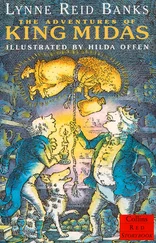Glyn Iliffe - King of Ithaca (Adventures of Odysseus)
Здесь есть возможность читать онлайн «Glyn Iliffe - King of Ithaca (Adventures of Odysseus)» весь текст электронной книги совершенно бесплатно (целиком полную версию без сокращений). В некоторых случаях можно слушать аудио, скачать через торрент в формате fb2 и присутствует краткое содержание. Год выпуска: 2009, ISBN: 2009, Издательство: Macmillan Publishers UK, Жанр: Старинная литература, на английском языке. Описание произведения, (предисловие) а так же отзывы посетителей доступны на портале библиотеки ЛибКат.
- Название:King of Ithaca (Adventures of Odysseus)
- Автор:
- Издательство:Macmillan Publishers UK
- Жанр:
- Год:2009
- ISBN:9780230744486
- Рейтинг книги:3 / 5. Голосов: 1
-
Избранное:Добавить в избранное
- Отзывы:
-
Ваша оценка:
- 60
- 1
- 2
- 3
- 4
- 5
King of Ithaca (Adventures of Odysseus): краткое содержание, описание и аннотация
Предлагаем к чтению аннотацию, описание, краткое содержание или предисловие (зависит от того, что написал сам автор книги «King of Ithaca (Adventures of Odysseus)»). Если вы не нашли необходимую информацию о книге — напишите в комментариях, мы постараемся отыскать её.
King of Ithaca (Adventures of Odysseus) — читать онлайн бесплатно полную книгу (весь текст) целиком
Ниже представлен текст книги, разбитый по страницам. Система сохранения места последней прочитанной страницы, позволяет с удобством читать онлайн бесплатно книгу «King of Ithaca (Adventures of Odysseus)», без необходимости каждый раз заново искать на чём Вы остановились. Поставьте закладку, и сможете в любой момент перейти на страницу, на которой закончили чтение.
Интервал:
Закладка:
In the late afternoon the inn was empty but for themselves and a few old men, left there by their families to sup wine and keep warm by the large hearth in the centre of the room. It was a low-ceilinged place lit only by the fire and the last of the afternoon light slanting in through the open doorway. Noisily, the Ithacans crowded onto the benches and began discarding their armour and weaponry like snakes shedding skin, leaving great flakes of leather, ox-hide and bronze about the floor. The old men broke off from their story-swapping and watched the newcomers with silent interest, perhaps recalling the days when their own bodies were filled with enough youthful strength to carry breastplate, spear and shield.
By the time they had settled down a huge woman brought in two earthenware bowls filled with cold water, followed by the innkeeper with two more. Moments later, as they were cleansing their hands and faces of the day’s dirt, the couple returned carrying a large krater of wine between them which had already been mixed with two parts of water. The soldiers wiped their hands dry on their tunics and filled wooden bowls with the wine, drinking deeply to slake their thirst whilst baskets of bread were passed. These were followed by plates of tough goat’s meat and dishes filled with salad and pulse. There were large numbers of tasteless barley cakes too, the likes of which had formed the mainstay of their rations on the journey to Messene.
There was no ceremony about the meal and they did not hold back in satisfying the hunger that days of marching, fighting and hard rations had inspired in them. There was very little conversation as they filled their ravenous stomachs, until finally they were using the last wafers of bread to wipe up the grease and fat from the plates. Then Mentor demanded more wine and the talk began to flow as their tongues were loosened.
At first they were polite to Iphitus, asking general questions about his home and his family. But the subject was turning with slow certainty to Heracles. They had all of them heard the youth tell Odysseus he was hunting horses allegedly taken by the most famous warrior in Greece, and there had been an undercurrent of excitement ever since the name of Heracles had been mentioned. Eperitus had already heard endless tales of his unmatchable strength, his prowess in battle and his seemingly endless sexual conquests. Some said he had diverted rivers with his own hands, others that he had slept with fifty maidens in one night, and all that he had killed a gigantic lion with his bare hands. These tales made the man a living legend, though until Iphitus’s brief mention of him the warrior from Alybas had no idea he was still alive. His nurse had told him stories about Heracles when he was a mere infant, so to him he was a figure more from myth than reality, a man from a past age who could hardly belong in their own fallen era.
But live he did, or so Iphitus testified. Neither did he need their encouragement to tell them the full story of Heracles’s visit to his home in Oechalia. The wine encouraged openness to their questions and soon the words were tumbling from his lips, which the Ithacans drank up like cattle at a trough. Even Odysseus leaned in over his cup to hear what their new companion had to say, though Eperitus noticed that his eyes continuously strayed to the bow leaning against the wall.
Long ago, Iphitus’s father Eurytus, king of Oechalia and a renowned archer, had offered his daughter in marriage to any man who could outshoot him. As Apollo himself had tutored Eurytus in archery he had every right to be confident of his marksmanship and was justly proud of his skill with the bow. Indeed his reputation was so widespread that few had bothered to take the challenge and his beautiful daughter, Iole, was in danger of becoming a spinster.
At that time Heracles was the king’s friend. Eurytus had taught him to shoot when he was young, and their bond of friendship had remained. But Zeus’s wife, the goddess Hera, bore a grudge against Heracles and induced a madness in him that caused him to slay his own children. When he regained his sanity he rejected his wife Megara and, upon the instruction of the Pythoness, served penance as a slave to King Eurystheus of Tiryns.
It was whilst he was Eurystheus’s bondsman that Heracles decided to challenge his old friend for Iole’s hand in marriage, seeing her as a potential replacement for the unfortunate Megara. Eurytus had no choice but to accept the challenger as a matter of honour, though he had misgivings because Heracles’s arrows were reputed to be magically guided to their target. And so they were, making Heracles the first man to defeat Eurytus in an archery contest.
But the king also knew of Heracles’s womanizing and his treatment of Megara. Friend or no, he loved his daughter too much to give her in marriage to the worst husband in Greece. So, Iphitus explained, his father declared the contest void because of Heracles’s magic arrows and threw him out of his palace. Iphitus alone complained at the treatment of their famous guest, goaded by his strong sense of fairness under the heroic code and the friendship which had formed between them during Heracles’s short stay.
‘It stung me to see a man as mighty as he thrown from the palace like a beggar,’ he said. ‘And when a few days later twenty-four of our prize horses were stolen, I was the only one who would not believe Heracles had taken them. Such a petty act of revenge is below him. It would have been more in keeping with his character to storm the palace single-handed and lay us all out on the flagstones, like so many fallen leaves in autumn.’
They pictured Heracles in their minds, a huge man, bigger even than Odysseus and half again as tall, smashing down the palace doors with one blow of his fist and then carving up Eurytus and his guards as if they were nothing more than a herd of goats. He crashed through their imaginations like a whirlwind until, finally, they noticed that Iphitus had stopped talking.
‘And what do you believe now?’ Mentor asked, the first to speak since Iphitus had begun his tale.
‘There are rumours amongst the people I’ve spoken with. They say a large number of horses were herded north to Tiryns by a lone warrior dressed in a lion’s skin, a huge man bound with muscles the size of boulders. That’s what they say. As for me, I left the trail to come south to Messene, in the hope that my father’s horses would be hidden here by thieves other than Heracles.’
Now Halitherses spoke: ‘And do you still refuse to believe your friend stole these prize horses? It seems clear to me he did. After all, everybody knows Heracles is a slave in Tiryns and wears the skin of the lion he slew in Nemea. To my ears the things you’ve heard aren’t rumours, but news.’
‘Yes, old man,’ Iphitus conceded. ‘Only a fool can deny it – or a friend. But even loyalty can’t stifle suspicion, and for a long time now I’ve known I must confront Heracles.’
Damastor sat back and gave a whistle, expressing the thoughts of them all. Eperitus looked at Iphitus in a new light. How could a mere youth even contemplate matching himself against Heracles? Only a man of extraordinary courage would seek out a fight that would end in his own ignominious death.
The band of soldiers looked at their guest in silence.
‘And how can you hope to get your horses back if Heracles has taken them?’ Odysseus asked. ‘You’re not unaware of his reputation.’
‘I have my bow. Here, take a look for yourself.’ Iphitus handed the curved weapon over with pride, taking satisfaction from Odysseus’s close and knowledgeable inspection of it. ‘Heracles may have magic arrows, but this bow was the gift of a god. Apollo gave it to my father, and he in turn to me, so you see it has divine powers. It can hit a hawk in the eye at twice the distance of any mortal’s weapon. And it can only be strung by the man to whom it is given freely. If Heracles himself were to find this weapon, for all his great strength he would not be able to fit a bowstring to it. So I tell you in full confidence that if my father’s horses are in his possession and he will not return them to me, then I will use this bow to mete out justice to him.’
Читать дальшеИнтервал:
Закладка:
Похожие книги на «King of Ithaca (Adventures of Odysseus)»
Представляем Вашему вниманию похожие книги на «King of Ithaca (Adventures of Odysseus)» списком для выбора. Мы отобрали схожую по названию и смыслу литературу в надежде предоставить читателям больше вариантов отыскать новые, интересные, ещё непрочитанные произведения.
Обсуждение, отзывы о книге «King of Ithaca (Adventures of Odysseus)» и просто собственные мнения читателей. Оставьте ваши комментарии, напишите, что Вы думаете о произведении, его смысле или главных героях. Укажите что конкретно понравилось, а что нет, и почему Вы так считаете.










